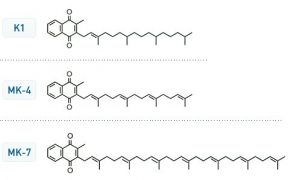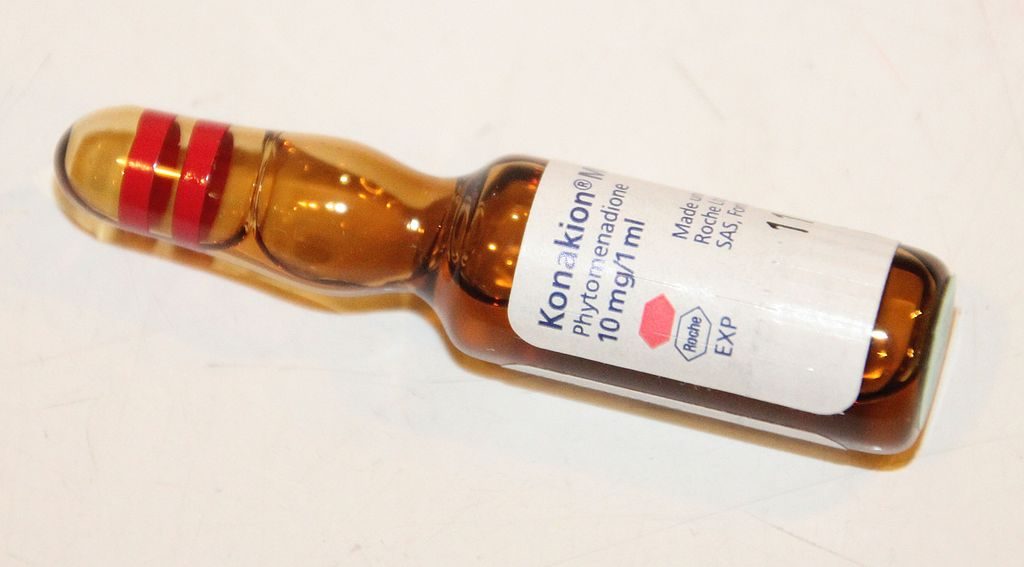Vitamin K is added to multivitamins for its roles in blood clotting, bone health, and prevention of calcification.

- Production of proteins. Vitamin K helps produce proteins that are involved in blood clotting, bone development, and prevention of calcium build up in blood vessels.
Overview
Vitamin K refers to a collection of fat soluble compounds that share the same structure. It is naturally present in a variety of foods in two distinct forms, phylloquinone (found in high amounts in dark leafy vegetables) and menaquinone (found in animal liver and cheese). Menaquinones are also made by bacteria in the human gut.
Vitamin K was initially famous for its contribution to forming blood clots, which is why it was named after the German word “koagulation.” Since then, it has also been found to play a role in bone maturation and reduction of unwanted calcium accumulation in blood vessels.
Recommended Dietary Allowances (RDAs) for Vitamin K
| Age | Males | Females |
| 0 – 12 months | 2.0 – 2.5 µg | 2.0 – 2.5 µg |
| 1 – 8 years | 30 – 55 µg | 30 – 55 µg |
| 9 – 13 years | 60 µg | 60 µg |
| 14 – 18 years | 75 µg | 75 µg (75 µg for pregnancy, 75 µg for breast-feeding) |
| 19+ | 120 µg | 90 µg (90 µg for pregnancy, 90 µg for breast-feeding) |
Foods High in Vitamin K
| Food | Serving Size | Amount per serving (µg) |
| Kale (raw) | 1 cup | 472 |
| Swiss chard | 1 cup | 299 |
| Broccoli | 1 cup | 220 |
| Lettuce (raw) | 1 cup | 46 |
| Canola oil | 1 tablespoon | 8 |
| Olive oil | 1 tablespoon | 3 |

How Vitamin K Supports General Health
Carboxylation
Vitamin K is needed to initiate the process of carboxylation in specific proteins. More specifically, vitamin K carboxylates:
- Glutamic acid, which is needed to make proteins that aid in blood clotting, which stops you from bleeding when you get a cut or injury
- Osteocalcin, which helps maintain bone health2 3
- Matrix-Gla protein, which prevents the calcification of blood vessels and other soft tissues4
Vitamin K’s Benefits as a Multivitamin
Most people get plenty of vitamin K from their diets, but it is still added to multivitamins to make sure that you reach the recommended dietary intake and do not have insufficient levels. In turn, this helps support its essential roles in blood clotting, bone health, and preventing the calcification of blood vessels.

Multivitamin Dosage
- Multivitamins typically include 25 – 100 µg of vitamin K in the form of phylloquinone and menaquinones.
Supplements in Review Says
- Vitamin K 120 – 250 µg as part of a multivitamin.
Vitamin K is essential to blood coagulation and bone health. Vitamin K is required for the proper functioning of the body given its roles in blood clotting, bone health, and prevention of calcium build up.
Take 120 – 250 µg of vitamin K. Take a multivitamin with around 120 µg or more. There is also some preliminary evidence that 250 µg may be necessary to maximize vitamin K’s bone-related effects.
Leave a Reply